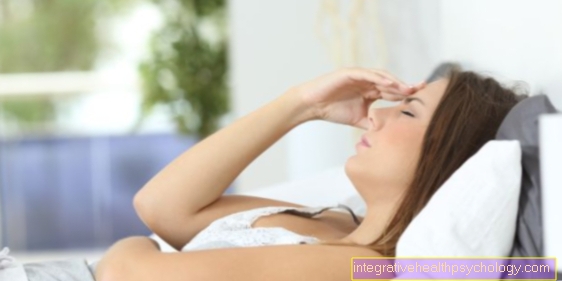
Premenstrual syndrome is a symptom that occurs periodically just before the onset of menstruation. These complaints can consist of many different components and almost always also have a psychological component. In many women this manifests itself in a depressed mood up to depression. It is important to distinguish whether the woman basically suffers from depression or whether this is triggered solely by the premenstrual syndrome.
The treatment of depression in premenstrual syndrome is a combination of psychotherapy and medication.
Also read how you can recognize premenstrual syndrome:
You can recognize premenstrual syndrome by these symptoms
$config[ads_text1] not found
There are strong hormone fluctuations in the female cycle. Hormones, including the fluctuating sex hormones, influence the whole body and also have a direct effect on the psyche. This can lead to a depressive mood completely independently of other illnesses or, in the case of a fundamentally existing depression, trigger or intensify a depressive episode.
Women who are under great strain in their families or at work are particularly prone to depressive moods during their cycle.These can occur without other symptoms of premenstrual syndrome being present.
Find out more about the topic here: Premenstrual syndrome.
Premenstrual syndrome is a combination of up to 30 different symptoms, all of which can be combined with depression. Abdominal pain, flatulence, loss of appetite or hunger attacks are some of the physical symptoms that a particularly large number of those affected report. Acne and skin blemishes are also common symptoms.
$config[ads_text2] not foundMany affected women also experience water retention all over their bodies. The hands, feet and breasts are particularly affected. Since this is also visible, it is a psychologically problematic symptom. The premenstrual syndrome can also lead to a variety of psychological complaints in addition to depression. These include anxiety, sleep disorders, concentration problems, irritability and aggressiveness, and mood swings.
Not all affected women develop all symptoms, but the symptoms can also appear separately from one another. The severity of the symptoms also varies from person to person. If there is a predominance of psychological symptoms and severe depression, gynecologists speak of a premenstrual dysphoric disorder, also called PMDS. This particularly severe form of premenstrual syndrome affects less than five percent of affected women.
Premenstrual Syndrome and Nausea? Find out more here.
The diagnosis of premenstrual syndrome is often made through diaries. The women should write down for a few weeks when they have their days and when the symptoms occur.
What can be signs of depression? A diagnosis of depression is usually made by a psychiatrist and the diagnosis is made through discussions and standardized questionnaires. Especially with the combination of a premenstrual syndrome and a depressive episode, the diagnosis is not a physical finding and cannot be clarified with laboratory values or X-rays, but is based almost exclusively on the stories of those affected.
$config[ads_text3] not found
For more information about diagnosing and performing possible tests as part of a PMS, read our article: Test for premenstrual syndrome
$config[ads_text2] not foundTherapy for premenstrual syndrome with depressive episodes depends on the extent of the symptoms. Initially, an attempt is usually made to get a grip on the symptoms with relaxation exercises, exercise and a balanced diet.
If this attempt fails, there is the option of hormonal treatment. Here, hormonal contraceptives are used that prevent ovulation and supply the body with a constant dose of hormones. In this way, the hormone fluctuations that are often causal can be prevented and the symptoms should decrease. In this case, the pill should be taken continuously and without a break.
Read more on the topic: Premenstrual syndrome despite taking the pill
Medicines can also be used directly against certain symptoms. Commercially available painkillers such as ibuprofen or paracetamol help against the pain. Diuretics can be prescribed for water retention. A combination therapy of psychotherapy and medication is usually used against the depressive mood. Mood enhancers such as sertraline or citalopram can be used. However, this is only used if the symptoms cannot be combated in any other way, as these preparations are associated with many side effects. The natural St. John's wort also helps against slight depressive moods. This has fewer side effects, but not none at all. The therapies should be discussed with the treating gynecologist and psychiatrist.
More information about the pill get here.
$config[ads_text4] not found
In the case of severe depressive moods in connection with the premenstrual syndrome, drug therapy may be necessary. In this case, antidepressants from the group of selective serotonin reuptake inhibitors can be used. These include the preparations citalopram, sertraline and paroxetine.
Since antidepressants are drugs with many side effects, they should only be used if all other therapy options have not brought about any improvement in the symptoms and the symptoms bring about a significant reduction in everyday life.
For more information, read on: SSRI.
Depressive episodes that are directly related to premenstrual syndrome are usually cyclical relapses a few days before the menstrual period. When the menstrual period begins, the symptoms usually go away suddenly. This also applies to the depressive symptoms.
If the depressive episodes last for more than a few days, the differential diagnosis should consider an independent depression, which may have to be treated differently.
You might also be interested in: How can you recognize depression?
For women in whom the depressive mood occurs exclusively in the context of the premenstrual syndrome, the prognosis of becoming symptom-free with hormone therapy is very good. With the onset of menopause, the symptoms should completely subside even without therapy.
If you have a general predisposition to depression, the probability of being permanently symptom-free is lower.